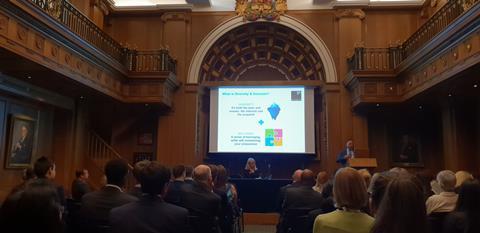Diversity and inclusion brings business benefits as well as better ethics, emphasised XL Catlin’s Paul Jardine

“It’s awkward”, Paul Jardine winced, to address an audience on diversity and inclusion (D&I), within Lloyd’s of London’s Old Library, a room decorated by so many portraits of previous Lloyd’s bosses – uniformly looking pale, male and stale
“Although actually, one of them, Peter Levene, like me, is Jewish, and I suspect that not all of them are straight,” quipped Jardine, at the start of his D&I speech to a room of insurance professionals, part of the Insurance Institute of London’s (IIL) lecture programme at Lloyd’s.
Jardine, a former deputy chairman of Lloyd’s, and a current board member at the London Market Group, is due to depart from his current full-time role as XL Catlin’s chief experience officer by the end of the year, following the acquisition of its XL Group parent by French insurer Axa.
He reeled off some of the plethora of excuses given for why the boards of FTSE-listed “major UK firms” still contain so few women. “These are major businesses operating in global markets and yet they have this problem,” he said.
Jardine’s talk focused on why D&I is important for the strategic health of a business, including a business case for how making real effort towards D&I helps reduce risk in the organisation, citing his experiences at XL Catlin.
“Our managing directors aim to cascade a culture of D&I down through the business,” said Jardine. “It’s not just because this is the right thing to do. This is about business value and better results,” he added.
In working towards greater D&I, Jardine suggested that making a start was crucial. “If you get one thing right, everything else should follow,” he said, adding that the more elements companies start to get right, the easier D&I will get, and the bigger the business benefits.
Jardine warned about recurring themes such as “change fatigue” and exhorted corporate decision-makers to go the extra mile, to bring about real cultural change, and to “drive and position how a business develops”.
To give an example, Jardine cited D&I efforts to make LGBT hires feel more comfortable within an organisation, saying there is evidence that this also led more vulnerable women also joining or rising through the ranks. “Because if they believe it the conditions are right for the LGBT community, then it must also be right for them,” he explained.
Too many organisations are failing to do all that they can to encourage talented women to re-join after having children, he stressed. Returner programmes to get people up-to-speed would go a long way, he suggested. Seniority and pay are too often dependent on uninterrupted time served, he complained.
More flexible working hours would help parents balance their lives, he suggested, noting that too many organisations are still allergic to people working non-standard hours or working from home. Despite technology overcoming most of the legitimate barriers to achieving this, “there is still a stigma there,” Jardine noted.
When coming up with longlists of candidates to fill a vacancy, he emphasised the importance of spelling out that they should be “suitably qualified for the role”. This is because, he noted, long lists can play lip service to D&I, but somehow the winning candidates all too often tend to be drawn from the same predictable demographics.
He touched on the importance of acknowledging and understanding the concept of unconscious bias – the hard-wired prejudices that humans use to drive their decision-making without even noticing. “If you have a brain, you have unconscious bias, and you can also take bias out of the brain,” said Jardine.
Taking a critical approach to reviewing situations where unconscious bias is at play can benefit hiring practices as well as the nurturing of talent, he suggested. Jardine also noted that although he was the first member of his family to go to university, he thought he had benefitted from unconscious bias in his career.
In his former role as deputy chairman of Lloyd’s for example, Jardine reflected that many people must have (erroneously) presumed he was related to one of the founders of Jardine Lloyd Thompson. “The unconscious mind is incredibly powerful, but also incredibly prone to making crass mistakes,” he added.
With an eye to the makeup of the assembled audience – many of whom were there as part of the IIL’s educational programme – Jardine gave his view on D&I within the insurance sector.
“It’s going slow, but I think, generally speaking, we’ll be absolutely fine,” he said. “If most or all of you stay within the industry for the next five to ten years, we’ll have a fundamentally different picture.”




















No comments yet